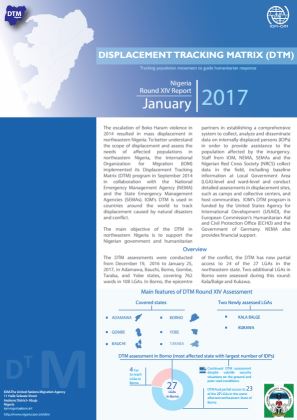-
Countries
-
Data and Analysis
-
Special Focus
-
Crisis Responses
Nigeria
Nigeria
Suivi des PDI
Mouvements de déplacement
3,340,000
IDMC 2023
cycle de collecte de données
À propos Nigeria
The escalation of violence between all parties in north-eastern Nigeria since 2014 has resulted in mass displacement and deprivation in the states of Adamawa, Bauchi, Borno, Gombe, Taraba and Yobe. To better understand the scope of displacement and assess the needs of affected populations, IOM has been implementing its Displacement Tracking Matrix (DTM) programme starting July 2014, in collaboration with the National Emergency Management Agency (NEMA) and State Emergency Management Agencies (SEMAs). The activities of the DTM project, which consist of conducting baseline assessments and registration for IDPs living in camps and host communities, are currently being carried out in Adamawa, Bauchi, Borno, Gombe, Taraba and Yobe.
The information collected will contribute to the provision of a comprehensive profile of the IDP population in Nigeria which will be shared with all relevant stakeholders and will contribute towards enabling the government of Nigeria and humanitarian partners identify the needs of Nigeria's displaced population and develop interventions for providing IDPs necessary assistance.
Contacter
DTM Nigeria
DTMNigeria@iom.int
Bailleurs de fonds
- ECHO
- BHA
- Canada
Nigeria — Displacement Report 14 (19 December 2016—25 January 2017)
Between December 2016 and January 2017, the number of identified IDPs increased by 129,386 individuals (7.3% increase). This brings the total number if IDPs in Nigeria to 1,899,830 (337,353 households).
Pagination
- First page
- Previous page
- …
- 54
- 55
- 56
- 57
- 58
- 59
- 60
- 61
- 62
Pagination
- First page
- Previous page
- 1
- 2
- 3
- 4
- 5
- 6
- 7
- 8
Pagination
- First page
- Previous page
- 1
- 2
- 3
- 4
- 5
- 6
- 7



